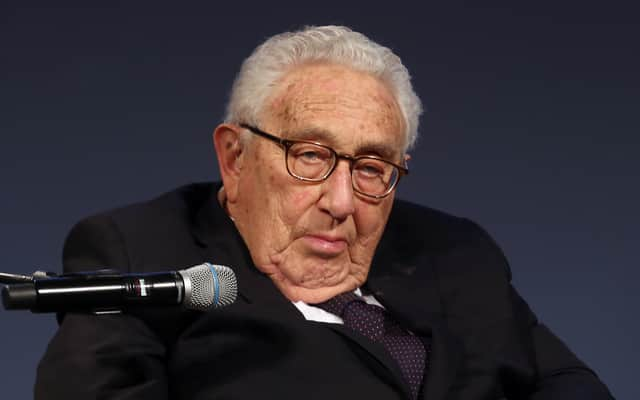Henry Kissinger: Former US Secretary of State who became polarising figure during Cold War dies aged 100


Former US foreign policy chief Henry Kissinger has died at the age of 100. Kissinger is known for his time serving as Secretary of State, a role he held from 1973 to 1977.
The German born diplomat, who fled to the US with his family in 1938 to escape Nazi persecution, served as Secretary of State under Richard Nixon and Gerald Ford, having first served as a National Security Adviser under Nixon. Kissinger became instrumental in US foreign policy, and in turn became one of the most divisive figures in US politics.
Advertisement
Hide AdAdvertisement
Hide AdHis most notable work on foreign policy saw the conclusion of the US's involvement in the Vietnam War, as well as the creation of so-called "shuttle diplomacy", in which he acted as an outside mediator to end the 1973 Yom Kippur war. He was also hugely influential in opening up relations with China at the time.
Throughout his career in politics, he also became a polarising figure for many pieces of legislation and policy. This included the US-led bombing of Cambodia during the Vietnam War, as well as turning a blind eye to war crimes committed by US allies during his time as Secretary of State.
His handling of the Cold War also drew criticism from some. Critics often remarked that he would put the US's rivalry with the Soviet Union ahead of the human toll.
In 1973, he was controversially awarded the Nobel Peace Prize jointly with North Vietnam's Le Duc Tho, who would go on to refuse to accept the award with him as he believed peace had not actually been reached yet. It became one of the most controversial moments in Nobel history, with two members of the Nobel committee resigning over Kissinger being awarded in the first place.
Advertisement
Hide AdAdvertisement
Hide AdKissinger was awarded it in part for his role in securing a ceasefire between the North and South, however Tho's claim was founded when the South fell to the North just 18 months later. Kissinger donated his prize money to charity and offered to hand back the medal after the fall of the south.
Despite his polarising history, US leaders and presidents such as George W Bush would continue to consult Kissinger long after he left government. Bush said in a statement that he was one of the most "dependable and distinctive voices on foreign affairs".
He added: "I have long admired the man who fled the Nazis as a young boy from a Jewish family, then fought them in the United States Army. When he later became Secretary of State, his appointment as a former refugee said as much about his greatness as it did America's greatness."
Rishi Sunak's official spokesman said: "The Prime Minister met Mr Kissinger around his 100th birthday in London just last summer. His thoughts are with Henry Kissinger's family and loved ones today.
Advertisement
Hide AdAdvertisement
Hide Ad"Mr Kissinger had perhaps the most profound influence on American foreign policy of any person in the last 50 years. He leaves behind a lasting legacy and his experience and insight will be greatly missed."
Kissinger is survived by his wife Nancy Maginnes Kissinger, his children from his first marriage David and Elizabeth, and five grandchildren. A statement from Kissinger Associates, his consulting firm, read: "He will be interred at a private family service. At a later date, there will be a memorial service in New York City."
Comment Guidelines
National World encourages reader discussion on our stories. User feedback, insights and back-and-forth exchanges add a rich layer of context to reporting. Please review our Community Guidelines before commenting.
